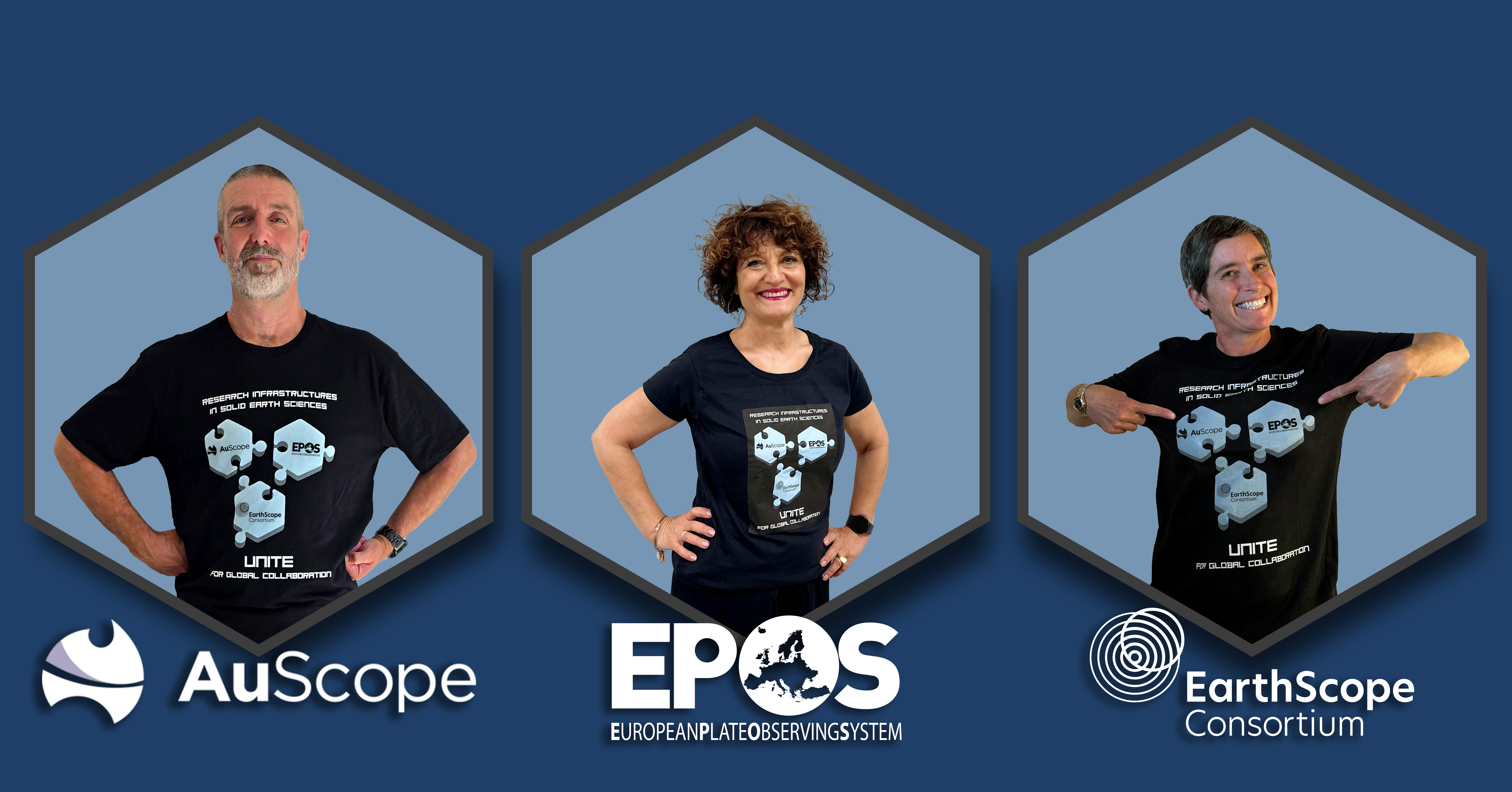Solid Earth Research infrastructures in Europe, the US, and Australia announce landmark agreement to enhance collaboration across continents, inviting global participation
The European Plate Observing System, AuScope, and EarthScope Consortium today announced a memorandum of understanding that marks the beginning of a new era of geoscientific collaboration among three of the world's leading Solid Earth science research infrastructures. This strategic partnership will strengthen cooperation in critical areas such as governance, data interoperability, and capacity building, laying the groundwork for global collaboration in the field of geosciences.
The signing underscores a shared vision: to advance groundbreaking geoscientific research by building an integrated and collaborative global research platform that is open and available to scientists from all around the world. The aim is to promote the sustainable and inclusive use of multidisciplinary Solid Earth science data, thus opening doors to innovation and helping tackle high-impact challenges such as disaster mitigation and management and climate change adaptation.
Collaborating for a Global Vision
The partnership between EPOS, AuScope, and EarthScope will address common global challenges through coordinated action by establishing a collaboration that other infrastructures and research entities can join to further bridge barriers across regions, countries, and continents.
Tim Rawling, CEO of AuScope, emphasised the importance of international partnerships in achieving this vision:
"Building international partnerships is essential to fostering equitable and inclusive geoscience research. By uniting efforts across continents, we can maximise the impact of joint investments, expertise, and data. This collaboration is a vital step toward establishing FAIR (Findable, Accessible, Interoperable, and Reusable) data stewardship in our domain, ensuring equal opportunities for researchers worldwide."
The memorandum of understanding identifies key areas where international cooperation is poised to make the greatest impact, including governance and sustainability, policy development, and the promotion of FAIR and CARE (Collective Benefit, Authority to Control, Responsibility, Ethics) data principles. These efforts will enhance the scalability and sustainability of research infrastructures, ensuring they not only support excellent scientific research but also address urgent societal needs.
Rebecca Bendick, CEO of EarthScope, expressed her excitement about the partnership's potential:
"Joining forces with EPOS and AuScope is an incredible opportunity. This agreement is more than just a declaration of intent—it’s a concrete action plan that will drive technical innovation and skill development among researchers and IT experts. We’re eager for other global players to join this initiative and help build a truly international geoscientific community."
Concrete Actions for a Global Research Infrastructure
Lilli Freda, Executive Director of EPOS ERIC, noted that the collaboration has been in the making for years, with ongoing discussions revealing the potential for a united approach to addressing global challenges:
"From the very start, we saw the potential to create real value for our research communities by working together. This memorandum of understanding is not just about agreeing on principles; it's a roadmap for concrete actions, especially in areas like data interoperability. In many ways, this agreement is the first step toward building a global Research Infrastructure for Solid Earth science, openly accessible to researchers everywhere."
The memorandum outlines specific actions, including a set of meetings and technical workshops in 2025 on topics including cyberinfrastructure and workforce development. The members of the partnership aim to, for example, share information about technical solutions and effective models for various efforts, and to align on common standards where possible to improve data usability. These initiatives will ensure that the infrastructures remain at the forefront of technological advancements and continue to promote Open Science on a global scale.
A Call for Global Engagement
The newly formed partnership is designed to be dynamic and open, with an invitation extended to research infrastructures from other world regions to join. The goal is to foster the development and adoption of common solutions, paving the way for a more integrated and interoperable global research infrastructure. One of the first orders of business for the members is the establishment of an exploratory committee that will review international calls for proposals aimed at solving global challenges and strategizing on new frontiers in the Solid Earth science domain. This collaboration welcomes participation from research infrastructures across the globe, to join us in building a collaborative, interoperable, and global geoscientific community.
About
EPOS, the European Plate Observing System, is the only pan-European Research Infrastructure for solid Earth science, providing access to FAIR interoperable quality-controlled data, data-products, services, and software. Its platform currently integrates data from about 500 data and service providers and ten thematic communities, distributed across 26 countries in Europe.
AuScope is Australia’s provider of research infrastructure to the Earth and Geospatial Science community. By providing tools, data, services and analytics, AuScope enables scientists to understand Earth’s evolution through time and how resources can be sustainably utilised to support growing human demands. AuScope invests in a variety of observational and analytical infrastructures spanning geodesy, geophysics, geochemistry, and characterisation, as well as software development, research data repositories and analysis tools.
EarthScope is dedicated to supporting transformative global geophysical research and education. It operates multiple research facilities, including the NSF Geodetic Facility for the Advancement of Geoscience (GAGE) and NSF Seismological Facility for the Advancement of Geoscience (SAGE).
Contact Information
AuScope
Philomena Manifold philomena@auscope.org.au +61 417 539 683
EarthScope
Scott Johnson scott.johnson@earthscope.org
EPOS
Federica Tanlongo federica.tanlongo@epos-eric.eu +39 06 51860842
Karl Stuebe karl.stuebe@epos-eric.eu
